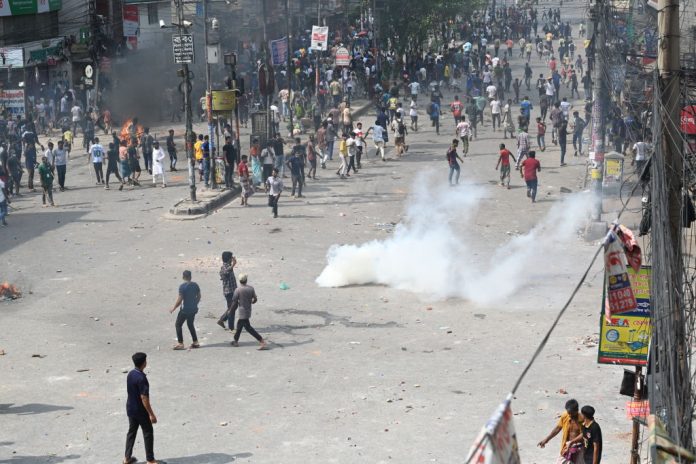Amid escalating student-led anti-government protests, Bangladesh has imposed a nationwide curfew and disabled mobile internet services to curb disinformation. Following the curfew, authorities have shut down schools and universities indefinitely.
The nationwide protests, sparked by opposition to job quotas, have led to heightened security measures. The Border Security Forces (BSF) conducted security checks at the Indian Immigration check post in Fulbari, Jalpaiguri.
The curfew announcement on Friday evening came after clashes between police and student groups resulted in dozens of deaths, according to The Washington Post.
Violence on Thursday in 47 of Bangladesh’s 64 districts killed 27 and injured 1,500. By Friday night, the total number of those dead from the protests reached 105, AFP separately reported, citing hospitals. Reuters could not immediately verify the reports and police have not issued a casualty toll.
The U.S. Embassy in Dhaka said that reports indicated more than 40 deaths and “hundreds to possibly thousands” injured across Bangladesh. In a security alert, it said protests were spreading, with violent clashes being reported across Dhaka. The situation was “extremely volatile,” it said.
Student Protests
The unrest began with students protesting a new policy that reserves a portion of government jobs for descendants of the nation’s freedom fighters. The protesters attacked the state television headquarters in Dhaka and set fire to police booths on Thursday, calling for a “complete shutdown” of the country.
Street battles between security forces, who are using rubber bullets and tear gas, have brought life in several neighborhoods to a halt, as reported by Bangladeshi media.
Additionally, several leading Bangladeshi newspaper websites have not been updated since Thursday or are inaccessible, and television channels have been taken off the air.
The Indian High Commission in Dhaka is coordinating with local authorities to ensure the safety of students traveling to India. The Indian mission, in collaboration with BSF and the Bureau of Immigration, is facilitating the return of Indian students from Bangladesh. A total of 245 Indian nationals, including 125 Indian students and 13 Nepali students, arrived on Friday through the Gede border crossing in West Bengal.
The protests, initially driven by anger over job quotas, have also been fueled by high unemployment among young people, who make up nearly a fifth of Bangladesh’s 170 million population. Some analysts suggest that the violence is also being driven by wider economic woes, such as high inflation and shrinking foreign exchange reserves.
The protests have opened old and sensitive political fault lines between those who fought for Bangladesh’s independence from Pakistan in 1971 and those accused of collaborating with Islamabad. The former include the Awami League party of Prime Minister Sheikh Hasina, who branded the protesters “razakar,” a term used to describe independence-era collaborators.

